Introduction
In the process of growing up, children encounter various challenges that shape their behavior
and development.
One common behavior exhibited by big kids, or older children, is telling lies.
Understanding the reasons behind this behavior and implementing effective strategies to
address it can foster honesty, trust, and positive character development.
In this article, we will explore why big kids tell lies and provide practical tips on how to stop
them, emphasizing the keyword “big kids telling lies” and strategies to address this issue.
The Psychology Behind Big Kids Telling Lies
Big kids telling lies can be a cause for concern for parents and educators alike.
However, it is essential to recognize that lying is a natural part of a child’s cognitive and
social development.
Several reasons can contribute to this behavior:
a) Testing Boundaries:
As big kids seek to assert their independence, they may test the limits of honesty to
understand the consequences and reactions that follow.
b) Fear of Punishment:
Children may resort to lying when they anticipate negative consequences or punishment
for their actions.
Fear of judgment or reprimand can drive them to conceal the truth.
c) Social Pressure:
Peer influence and the desire to fit in can lead big kids to tell lies.
They may exaggerate stories or fabricate information to gain acceptance or maintain a
certain image among their peers.
d) Attention-seeking:
Some big kids may resort to lying as a means to attract attention, especially if they feel
neglected or overshadowed in their environment.
Strategies to Curb Lying in Big Kids
Addressing and curbing the habit of lying in big kids requires a patient and proactive
approach.
Here are some effective strategies to consider:
a) Foster Open Communication:
Create an environment where big kids feel comfortable expressing themselves without fear
of judgment or punishment.
Encourage open dialogue and active listening to understand their concerns and motivations.
b) Model Honesty:
Children often mimic the behavior they observe. As adults, it is crucial to model honesty
in our daily lives.
Demonstrating integrity and admitting our mistakes can positively influence big kids’
behavior.
c) Reinforce Positive Behavior:
Praise big kids when they exhibit honesty, even in challenging situations.
Positive reinforcement motivates them to continue being truthful and reinforces the values
associated with honesty.
d) Teach Problem-solving Skills:
Help big kids develop effective problem-solving skills.
Encourage them to seek alternative solutions rather than resorting to lies when faced
with difficult situations.
Empowering them to find honest ways to address their concerns builds their confidence
and resilience.
e) Set Clear Expectations and Consequences:
Establish clear rules and expectations regarding honesty and discuss them openly with big kids.
Communicate the consequences of lying, such as loss of privileges, in a calm and consistent
manner.
Consistency is key in reinforcing these expectations.
f) Encourage Empathy and Perspective-taking:
Help big kids understand the impact of their lies on others.
Encourage them to consider the feelings and trust they might be compromising through dishonesty.
Promoting empathy can foster compassion and discourage lying.
g) Seek Professional Guidance:
If lying persists despite consistent efforts, consider seeking professional help from a child
psychologist or counselor.
They can provide specialized guidance and interventions tailored to your child’s needs.
Conclusion
Understanding why big kids tell lies is essential to address this behavior effectively.
By implementing strategies such as fostering open communication, modeling honesty,
reinforcing positive behavior, teaching problem-solving skills, setting clear expectations,
encouraging empathy, and seeking professional guidance if needed, parents and educators
can help big kids develop a strong foundation of integrity and honesty.
By consistently emphasizing these values, we can guide big kids towards becoming
trustworthy individuals who value truthfulness and understand the importance of honesty in
their relationships and personal growth.
![]()











